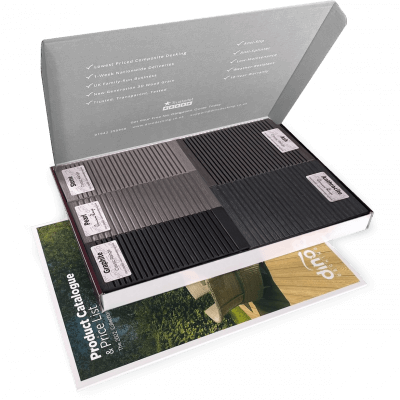How to Protect Composite Decking: Full Guide
Find out how protecting your composite decking can help keep your decking looking its best for years to come. You
Products in Stock
Lowest Prices
Express Delivery
10-Year Warranty
Early July Sale. Up To 15% Off.

Are you planning to build a new deck or replace your existing one, but can’t decide between vinyl and composite decking? This is a common question we hear a lot; after all, these two popular decking materials have unique characteristics that make them appealing to different homeowners. In this post, we’ll compare vinyl and composite decking side-by-side, examining key factors like durability, maintenance, cost, and more. By the end, you’ll have a clearer understanding of which material best suits your needs and preferences. Let’s dive in!
Vinyl decking, also known as PVC decking, is made entirely from polyvinyl chloride (PVC), a synthetic plastic polymer. It’s designed to mimic the look of natural wood while offering superior resistance to moisture, insects, and decay. Vinyl decking is available in a range of colors and styles, from classic wood grain patterns to modern, solid hues.
Composite decking is manufactured using a combination of wood fibers and plastic polymers, typically polyethylene (PE) or polypropylene (PP). This blend of materials creates a decking product that combines the natural beauty of wood with the low-maintenance durability of plastic. Like vinyl, composite decking comes in a variety of colors and finishes to suit different design preferences. Read more about what composite decking is here.
Both vinyl and composite decking are designed to withstand the elements better than traditional wood. However, there are some key differences in their durability:
When it comes to aesthetic appeal, both vinyl and composite decking have their strengths:
One of the main advantages of both vinyl and composite decking is their low maintenance needs compared to wood:
The initial cost and long-term value of vinyl and composite decking are important factors to consider:
For eco-conscious homeowners, the environmental impact of decking materials is a key consideration:
Safety is paramount when choosing a decking material, especially in areas prone to moisture or around swimming pools:
Pros:
Cons:
Pros:
Cons:

Deciding between vinyl and composite decking ultimately comes down to your individual needs, preferences, and priorities. Here are some key factors to consider:
Think about your initial budget for the decking project, as well as the long-term costs associated with maintenance and potential repairs or replacement. While vinyl may be cheaper upfront, composite may offer better value over time due to its durability and low upkeep.
Consider the overall aesthetic you want for your outdoor space. Do you prefer the natural look of wood or the clean, modern appearance of vinyl? Keep in mind that composite decking can closely mimic real wood, while vinyl may have a more artificial look.
Evaluate your local climate and the specific needs of your decking environment. If you live in an area prone to heavy moisture or humidity, vinyl may be the better choice for its superior water resistance. However, if you prioritise a more natural look and better slip resistance, composite may be the way to go.
Think about how much time and effort you’re willing to invest in maintaining your deck. Both vinyl and composite require less upkeep than wood, but vinyl is generally the most low-maintenance option. If you want a deck that looks great with minimal work, vinyl may be the best fit.
If eco-friendliness is a top priority for you, consider the environmental impact of each material. Composite decking often contains recycled materials and may have a lower carbon footprint over its lifespan, while vinyl is made from 100% synthetic materials and is not biodegradable.
Choosing between vinyl and composite decking is a personal decision that depends on your unique needs, preferences, and budget. By carefully considering factors like durability, maintenance, cost, and environmental impact, you can select the material that best suits your outdoor living space.
At Dino Decking, our premium composite decking boards are designed to withstand the elements while closely resembling the natural warmth and charm of real wood. Plus, we offer free samples and next-day delivery across the UK, making it easy to experience the quality of our products firsthand. If you’re still unsure about which decking material is right for you, we invite you to explore our in-depth composite decking and PVC comparison to learn more about the unique benefits and drawbacks of each option. And don’t forget – our knowledgeable team is always ready to answer your questions and help you make an informed decision for your decking project.

Our sample pack contains a sample piece of each colour currently available. Order your free sample pack today to compare the colours and get a true feeling of the Dino Decking range!
Find out how protecting your composite decking can help keep your decking looking its best for years to come. You
It’s quite common to end up with leftover decking after most installation projects. Offcuts and spare boards don’t need to
Business hours
Monday: 09:00 – 17:30
Tuesday: 09:00 – 17:30
Wednesday: 09:00 – 17:30
Thursday: 09:00 – 17:30
Friday: 09:00 – 17:30
Saturday: Closed
Sunday: Closed
Contact us
01942 355968
support@dino.co.uk
Collection Address: Unit 1 Wetheral Close Hindley Ind Estate Wigan Greater Manchester North West WN2 4HS
Pages
Products
Testing
Copyright 2025 Dino Decking Ltd All Rights Reserved.
VAT Number: GB296097848.
Company Number: 10837233.